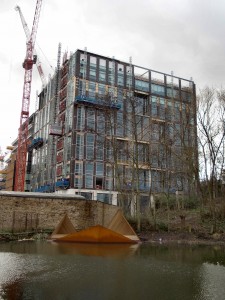Everyone in the packed council chamber turned to look at the chairman of the planning committee. The members had voted 6-6: a tie. “As chair with the casting vote, I am voting for the development.” There was stunned silence. The developers said nothing. We objectors took a deep breath and said nothing. Gunnersbury Triangle Nature Reserve would never be the same again.
London Wildlife Trust’s other central London reserve at Camley Street is also changing. A 10 storey block has cut off the view. Were all our reserves being trashed? Were we fighting for nothing? 30 years ago a passionate campaign saved the Gunnersbury Triangle from becoming four industrial units. Miraculously, with a huge input of volunteer effort, it became a wet woodland with little meadows, grassy banks, leafy paths, a handy pond for school pond-dipping. Now it’s surrounded by 4, 6, 8-storey buildings. The latest one at Colonial Drive is right up against the reserve boundary — at the top of a ten-foot bank. The quiet meadow and scrubby corner where the whitethroats nested will be illuminated 24 hours a day by stray lamps from a wall of flats. “I’m desperately saddened at the insensitive nature of the development — it robs local people of the sense of countryside,” says long- time campaigner and Gunnersbury Triangle committee member Jan Hewlett.
Certainly, the reserves will feel different. But Camley Street has a new ‘Viewpoint’, an architect-designed floating open-air classroom. It will be beautiful to sit and learn on the canal, in the little watery oasis in the midst of the busy city. At Gunnersbury Triangle, too, the blackcaps and thrushes will delight our hearts in springtime. School groups will still lie down on the boardwalk we built and enjoy catching newts, dragonfly larvae and ramshorn pond snails.
Our reserves must change with our great city. They do not feel like forgotten corners of countryside any more. They are little oases, islands in a sea of noise and pollution and traffic. They are special exactly because they are right in the heart of our vibrant capital city.

